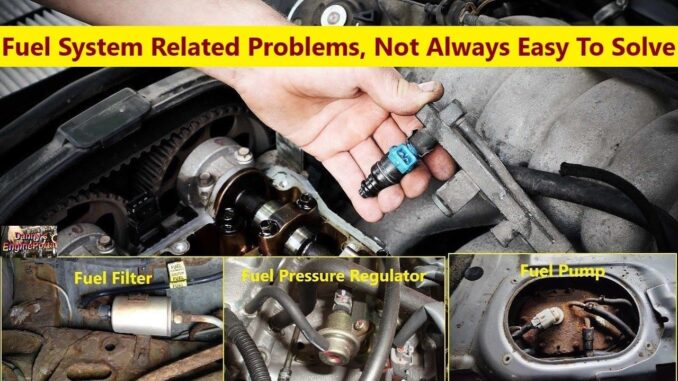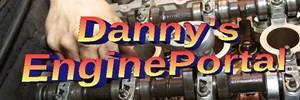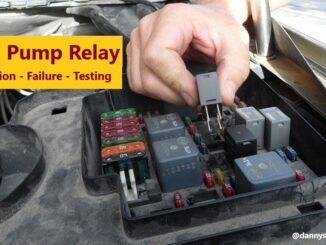
Fuel system related problems can be time consuming and difficult to solve.
Consequently, anything that might affect the flow and pressure, is going to result in poorer performance.
So, the biggest cause of any fuel system problem, is dirt.
Therefore, the weak link in the fuel system, is usually the fuel filter. Even though the very purpose of this part is to prevent any contaminants from getting into the fuel.
The Three Major Components Of Concern Are The:
- Filters
- Fuel Pump
- Injectors
Most Of The Failure Warning Signs, Are The Same For Most Fuel System Problems Including:
- Hesitating Engine
- Stalling
- Not Starting
- Hard Starting
- Different Performance, at Different Speeds
- Engine Misfiring
- Engine Sputters at High Speeds
- Loss of Power, When the Vehicle Is Under Load
- Surging
- Decreased Gas Mileage
Let’s Talk About Three Common Fuel System Problems
1. The Fuel Filter
I Would Say The Most Common Problem Is A Clogged Fuel Filter.
Make sure you follow your manufacturer’s recommendations, as to when you should change the fuel filter. This information, should be in your owner’s manual. The symptoms of a clogged fuel filter are often similar to an engine that’s suffering, with a bad fuel pump. So, in many cases these two components can fail together.
The fuel pump can start to disintegrate, leaving behind tiny ground up pieces directly into the filter. As a result, causing a clog in the fuel system. Whether you just have a clogged filter or bad fuel pump, the symptoms could look the same. Lack of power is the main complaint in this situation. But, the engine might run perfectly at idle.
2. The Fuel Pump
There are far more issues with electronic fuel pumps. The most common early sign of a problem is when driving a vehicle, at a consistently high speed. While traveling down the road the car will run well for a while. And, all of a sudden, begin to jerk or sputter, before returning to normal.
It Is Very Easy To Wrongly Diagnose A Sputtering Vehicle To One With:
- Bad or dirty gas
- An almost empty gas tank
- Other fuel related issues
Then, The Loss Of Pressure Causes The Engine To Sputter.
With a similar symptom to the previous, vehicles will jerk during acceleration from a stop. The car may produce a stalling sound and then accelerate smoothly.
Once you hit the gas pedal, a working pump increases the flow of gas in the fuel system. Once pressure is restored, the engine is able to run smoothly and the car takes off. Generally, this occurs when climbing a hill or when hauling a load. If your vehicle doesn’t lose power while driving you may find it surges, accelerating suddenly with no drive input.
Some may wrongly blame this on the fuel filter, thinking that it is not properly stopping dirt and rust. To diagnose such a break down, check for a blown fuse and pressure in the fuel line. Most modern electric fuel pumps, can be heard when you turn the key on. If you don’t hear the pump running and your car will not start, it could be your fuel pump.
Finally Number 3. The Fuel Injectors
If your engine’s fuel system develops a problem, with even one of its injectors, the symptoms should be immediately noticeable. A fuel injector that doesn’t open can cause hard starts, lack of power and a rough running condition. One that’s stuck partially open, can cause a loss of fuel pressure. And, will allow raw gas to leak into the cylinder.
Dirty injectors or ones that have failed completely, will either be stuck in the open or closed position. Eventually, the extra liquid from the fuel system, works its way down into the oil sump. After a while, you might be able to pull the oil dipstick and notice, an overfilled oil level.
Another sign that fuel is leaking into the oil is the smell of raw gas, mixed with the engine oil. The odor is often strong enough that you can smell it on the dipstick, when checking the level and condition.
Another common sign of a leaking injector, is a run on condition. When you turn off the key to shut down the engine, the injection process stops. The engine should immediately quit. Sometimes, it continues to run on or clatter and sputter, instead of turning off immediately. Consequently, you have fuel dripping into the combustion chamber.
A dirty injector is a possible cause, of the above condition. Build up of gum or carbon deposits on the tip, can prevent it from sealing completely. This allows raw fuel to continue to enter the cylinder. This is then ignited by heat and compression, like a diesel engine.
In Summary: Fuel System
So, at some point fuel delivery issues will only get worse. Finally, if your car is struggling for power, there is a good chance your fuel system is broken.
Thank You!




